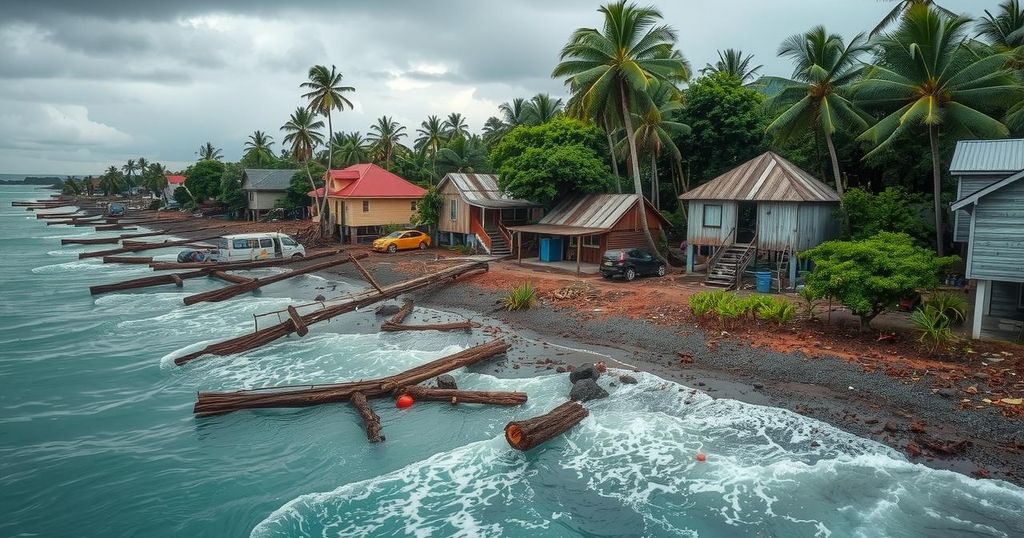Cyclone Chido’s Devastation in Mayotte and the Role of Climate Change

Cyclone Chido has devastated Mayotte, marking the most intense storm in 90 years, with at least 22 fatalities reported. Climate scientists link the increasing severity of storms in the region to human-caused climate change, particularly due to warming ocean temperatures. The lack of solid weather tracking infrastructure exacerbates vulnerabilities, necessitating immediate improvements in early warning systems to avert future catastrophes.
The Indian Ocean archipelago of Mayotte has suffered significant devastation due to Cyclone Chido, marking the most severe storm to impact the French territory in nearly nine decades. Official reports indicate that at least 22 individuals have perished following Chido’s landfall on Saturday, with fierce winds erasing entire neighborhoods, causing extensive infrastructure damage, and uprooting trees. While the southeast coast of Africa is accustomed to severe cyclonic activity, climate scientists have cautioned that storms in this region are becoming increasingly intense and frequent as a consequence of anthropogenic climate change.
Cyclone season in southeast Africa occurs from December to March, coinciding with the period when ocean temperatures peak, thereby providing a conducive environment for tropical storms to thrive. Recent years have seen a succession of destructive storms, including Cyclone Freddy in 2023, Batsirai in 2022, and Idai in 2019, which ravaged areas of Malawi, Mozambique, Zimbabwe, and Madagascar during the summer months of the Southern Hemisphere. It should be noted that while cyclones and hurricanes refer to the same meteorological phenomena, the term “cyclone” is predominantly used in the Indian Ocean and Australia.
The influence of climate change has been particularly significant in exacerbating cyclone ferocity. Due to human activities such as the combustion of fossil fuels, the planet’s temperature has risen by an average of 1.3 degrees Celsius (2.3 degrees Fahrenheit) relative to pre-industrial levels. This temperature increase is critical because warm water, typically exceeding 27 degrees Celsius (80 degrees Fahrenheit), serves as a crucial ingredient in the formation of cyclones. In the case of Cyclone Chido, ocean temperatures near 29 degrees Celsius fueled its intensity, resulting in stronger winds, heavier rains, and more severe storm surges.
A 2022 study conducted by climate scientists indicated that cyclones affecting southeast Africa were intensified by climate change; however, due to insufficient weather data in the region, quantifying the exact influence remains challenging. Additionally, there is a notable shortage of early warning systems throughout Africa. The World Meteorological Organization reports only 37 radar facilities dedicated to weather tracking on the continent, in stark contrast to Europe’s 347 and North America’s 291. This lack of infrastructure leaves vulnerable nations ill-prepared for extreme weather events, hampering timely evacuations. The death toll from recent catastrophic cyclones has unfortunately reached hundreds; notably, Idai claimed over 1,000 lives in 2019.
In response to this pressing issue, the United Nations initiated a project in 2022 aimed at ensuring that every individual worldwide can access early weather warnings within a five-year period. The Secretary-General of the WMO, Celeste Saulo, has emphasized the importance of improving access to weather forecasts, deeming it essential for adapting to climate change.
Cyclone Chido has emerged as a severe climatic event within the context of rising global temperatures attributed to climate change. The Indian Ocean region, particularly southeast Africa, has long been affected by cyclonic storms, yet there is a growing concern among scientists regarding their increasing severity due to human-induced climate change impacting ocean temperatures. As the majority of Africa grapples with inadequate meteorological infrastructure, communities remain at heightened risk during cyclone season, which runs from December to March. Historical data indicates a pattern of catastrophic storms correlating with this warming trend, compelling the need for improved weather monitoring systems to mitigate loss of life and property.
In summary, Cyclone Chido has inflicted severe damage upon Mayotte, underscoring not only the immediate human toll but also the broader implications of climate change on meteorological phenomena. With increasing ocean temperatures fueling more intense storms, the vulnerabilities faced by nations in southeast Africa are exacerbated by a lack of robust early warning systems. An urgent response is warranted to enhance infrastructure and prepare communities for future climatic challenges.
Original Source: www.seattletimes.com







